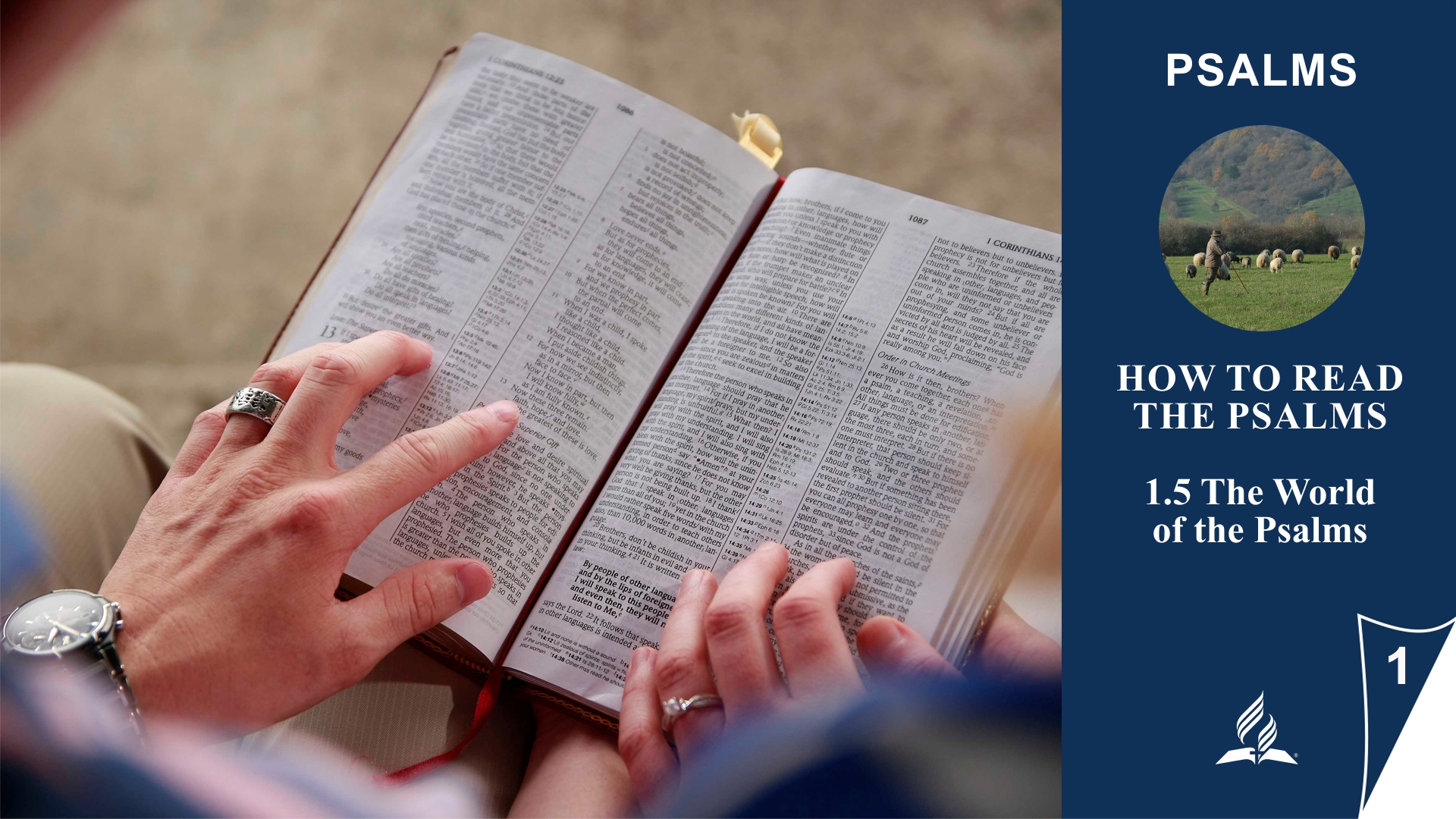

1.5 The World of the Psalms
Read Psalm 16:8; 44:9; 46:2; 47:2,8; 57:3; 62:9; 82:8, and 121:7. What significance does God hold in the lives of the Psalmists?
Let’s examine the selected Psalms together to gain insight into the significance of God in the lives of the Psalmists:
-
Psalm 16:8: “I have set the LORD always before me; because he is at my right hand, I shall not be shaken.”
-
The Psalmist expresses that God holds a central place in his life. Awareness of God’s constant presence provides him with security and stability.
-
-
Psalm 44:9: “But now you have rejected us and disgraced us and have not gone out with our armies.”
-
In this Psalm, the contrast to God’s previous support and guidance is emphasized. The Psalmists acknowledge God’s actions in their history, even in times of trial.
-
-
Psalm 46:2: “Therefore we will not fear though the earth gives way, though the mountains be moved into the heart of the sea.”
-
The Psalm emphasizes trust in God’s power and protection amid circumstances that would typically evoke fear.
-
-
Psalm 47:2,8: “How awesome is the LORD Most High, the great King over all the earth! … God reigns over the nations; God sits on his holy throne.”
-
The Psalmists praise the glory of God and highlight His exalted position in the city of Jerusalem and on the holy mountain.
-
-
Psalm 57:3: “He will send from heaven and save me; he will put to shame him who tramples on me. (Selah) God will send out his steadfast love and his faithfulness!”
-
The Psalmist calls on God for help, emphasizing the importance of God’s steadfast love and faithfulness in challenging times.
-
-
Psalm 62:9: “Those of low estate are but a breath; those of high estate are a delusion; in the balances, they go up; they are together lighter than a breath.”
-
The Psalmist relativizes the power and influence of people compared to God. He acknowledges the limited nature of human power and trusts in the absolute strength of God.
-
-
Psalm 82:8: “Arise, O God, judge the earth; for you shall inherit all the nations!”
-
The Psalm ends with a call to God to establish justice on the earth. God is seen as the highest judge and sovereign over all nations.
-
-
Psalm 121:7: “The LORD will keep you from all evil; he will keep your life.”
-
This Psalm emphasizes God’s willingness to protect, serving as a guardian and preserver from all evil and dangers.
-
In summary, these Psalms reveal that God holds a central and essential significance in the lives of the Psalmists. From daily guidance and the nearness of God to acknowledging His sovereignty and role as a protector and preserver, the Psalms reflect a deep connection and dependency on God.
The Psalms convey the idea of God as the sovereign Creator, King, and Judge over the entire earth, caring for the needs of His children. Trust in God is emphasized as a fundamental attitude, even in times when enemies sow doubt.
The Psalms show that the central position of God in life also leads to the central importance of worship. In biblical culture, worship was the natural focal point of the community’s life, and everything in the life of the people of God found expression in worship. Worship was understood as a place of encounter with God, where the Psalmist trusts that God hears and responds.
The dual aspects of God—distant and near, in heaven and in the temple, hidden and revealed—are addressed in the Psalms. These apparent contradictions are harmoniously connected to reflect the multifaceted nature of God. The Psalmists capture the spiritual tension between proximity and distance, concealment and revelation, strengthening their hope through the awareness of God’s goodness and presence amid their experiences.
Overall, the Psalms provide a profound insight into the theological depth and spiritual dynamics that shape the relationship between God and His people. The comments illustrate how the Psalms are not only historical documents but also offer timeless wisdom and comfort for believers in all life circumstances.
How can the Psalms help us understand that we cannot limit God to specific aspects of our existence? In which areas of your life might you be trying to keep God at a distance?
The Psalms help us understand that we cannot limit God to specific aspects of our existence by emphasizing the versatility and wholeness of God. Here are some ways the Psalms can contribute:
-
Holistic Worship: The Psalms cover a broad spectrum of human experiences, including joy, sorrow, fear, gratitude, and doubt. This teaches us that we can worship God in all areas of life, whether we are in moments of joy or trial.
-
God’s Sovereignty: Many Psalms emphasize God’s sovereignty over all aspects of life. By grasping this truth, we acknowledge that God is not limited to specific areas but reigns over everything.
-
God’s Nearness and Distance: The Psalms show that God is both distant and near. He is in heaven but also present in the sanctuary and among His people. This tension teaches us that God’s work can touch our lives in various ways and levels.
-
Experience of Grace and Judgment: The Psalms reflect the experience of God’s grace and also of His punishment. This reminds us that God embodies both mercy and justice, caring for our entire being.
Regarding the personal question about areas where I might be trying to keep God at a distance, self-reflection can be helpful. This could occur in relationships, professional challenges, or personal decisions. The Psalms can encourage us to be aware that God is present in all areas of our lives and inspire us to seek a deeper connection with Him in each area.
Visited 64 times, 1 visit(s) today






